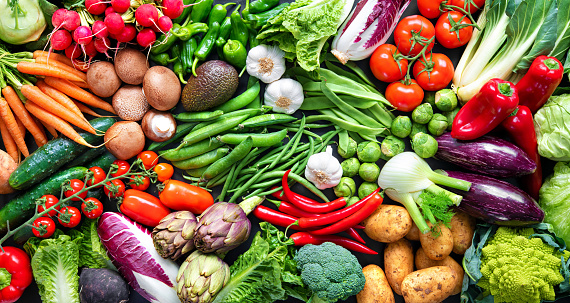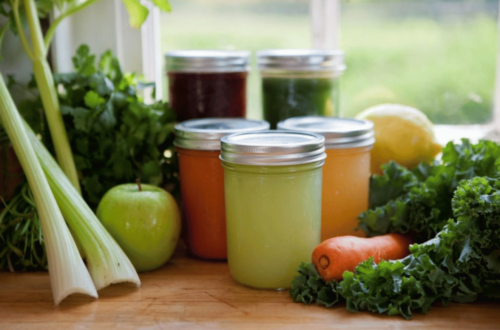Nutritive value of vegetables
Nutritional value of vegetables as food quality part is seen as the measure of their well-balanced ratio with regards to essentials nutrients; protein, fat, carbohydrates, vitamins and minerals in diet as required by their consumers.
With regards to the nutritional value of vegetables, they provide the following vitamins, minerals and phytochemicals. According to intechopen.com, they are powerful antioxidants.
- Water
- Minerals
- Vitamins
- Proteins
- Folates and Folic acid
- Fiber
- Carbohydrates
- Chlorophyll
- Phytochemicals
Water
Almost all vegetables hold about 90% to 95% water. This value is even more than milk which holds less than 88%. However, for this fact, it doesn’t make them less or low in nutritional value.
It is worthy to note that the 5% to 10% remaining which are solids contain substances with high therapeutic and biological value.
Minerals
Vegetables are quite high in minerals because they are good source of minerals. This is the reason why their alkalizing effects are quite beneficial to the blood and tissues. Therefore, the following are some of the minerals that are abundant with regards to nutritional value of vegetables.
- Potassium
- Iron
- Calcium
Potassium: This mineral is imperative for its diuretic and hypotensive effect which involves the lowering of the arterial blood pressure.
SEE ALSO: Matricaria Chamomilla Uses
Iron: Spinach iron content is 2.71 mg per 100 grams and this is greater than the iron contained in meat. Peas, beets, lamb’s lettuce and fava beans are all good sources of iron. Another nutritional value of vegetables in this aspect is that vitamin C facilitates iron absorption.

Calcium: Let’s take cabbage as an example, it contains 35 to 77 milligrams (mg) of calcium/100 g of weight. Compared with milk which holds about 119 milligrams per 100 grams, it is somewhat an important amount. Another advantage is that the body is good at absorbing the calcium contained in cabbage.
Vitamins
The following are the nutritional value of vegetables in terms of vitamins. Beta-carotene or provitamin A is contained in red-colored vegetables and orange. Other vitamins are; vitamins C, B (minus B12), K (which is found in alfalfa, spinach and cabbage)
Proteins
The protein content in vegetables should not be overlooked because the protein found in vegetables are quite important and another outstanding nutritional value of vegetables in this regard is that these proteins are somewhat superior to the proteins contained in fruits. However, they seem inferior to the proteins found in legumes and grains.
Furthermore, proteins which are readily available in vegetables hold all the essential and nonessential amino acids having the following considerations.
- Vegetables contain a great deal of lysine which is quite low as found in grains.
- Vegetables do not seem to provide all the level of methionine as required by the body. However, grains are highly rich in this particular essential amino acid.

Another nutritional value of vegetables we should note is that when vegetables are combined with grains, they make available complete protein, hence the phenomenon of supplementation.
It is noteworthy that the protein found in potatoes is the only complete protein that can be found in any vegetable.
YOU MAY LIKE:How To Increase Fiber Intake
Folates and Folic acids
In leafy vegetables, they are quite abundant especially in Spinach. And this is one of the essential nutrients recommended for pregnant women.
Fiber
This particular nutritive element is responsible for the feeling of satiation and also the satisfaction that links with eating. In cases of constipation, it is highly recommended.
Carbohydrates
Nutritional value of vegetables with regards to tubers are only made available in potato with a significant amount.
Chlorophyll
This is just the green pigment found in every plant. However, its effects is not known in the body but believed to potentiate production of blood.
Phytochemicals
Phytochemicals are all about the discovery made in nutrition science recently. Therefore, legumes, fruits and vegetables are the foods high in these elements. However, they are readily available in small amounts but they act as powerful antioxidants that help prevent cancer and coronary disease.
There are only two botanical families that are the richest in phytochemicals. They are:
- Liliaceae which are leeks, onions and garlic
- Cruciferae which include; radish, cabbage, watercress and turnip.
The phytochemicals in the vegetables mentioned above are highly rich in sulfur and this give them the piquant taste.
Importance of Nutritional Value of Vegetables
The following are the importance of having vegetables combined with other types of foods, their health and medicinal values and overall advantages of eating vegetables.
In essence, these are the benefits of vegetables
- Good for obesity cases
- They are natural laxatives
- Vegetables go well with legumes and grains
- Good for the elderly
- Vegetables are diuretic and Anti-hypertensive
- Source of minerals
- Anti-anemic
- They are anticarcinogens
Good for obesity cases
By eating vegetables, you maintain your weight because the nutritional value of vegetables is almost negligible as regards to fat and also their calories is quite low. As a matter of fact, they produce satiation sensation which relieves hunger feelings.
They are natural laxative
The nutritional value of vegetables regarding their fiber content helps in increasing the fecal matter volume and thereby aiding the passage via the digestive tract. Vegetables are best eaten cooked or grated to avoid indigestion which may come as a result of the vegetables not tender.
Vegetables go well with legumes and grains
When combine with other foods, they provide the required nutrients which may be lacking in other foods. These nutrients include:
- Provitamin A
- Vitamin C and
- Folates
Good for the Elderly
Nutritional value of vegetables to their low calorie content favors the elderly and also the calcifying and anti-carcinogenic effects make vegetables an ideal food for the elderly.
Source of minerals
Some vegetable such as turnip holds more calcium than milk and the inclusion of other minerals like magnesium, phosphorus, etc. another good source of calcium is calcium. Regarding the nutritional value of vegetable is this regard, the leaves and stalks of most vegetables are quite rich in minerals that help build tissues.
Therefore, in cases of osteoporosis and other calcium deficiency diseases, they are highly recommended.
Anti-anemic
The vegetable are the ones that foster the production of red blood cells:
- Beets
- Spinach
- Watercress
- Lamb’s lettuce
- Fava beans
It is noteworthy that their absorption is facilitates by the effects of vitamin C in the digestive system as well as chlorophyll and other trace elements.
Anti-carcinogens
In terms of the nutritional value of vegetables, especially the ones belonging to the Crufiferae family (radish, turnip, cabbage) and Liliaceae family (garlic, onion and leeks) hold substances that have proven effective results to neutralize the action of substances that are somewhat carcinogenic.
This particular nutritional value of vegetables help slow the growth of cancerous cells especially when they have already started. Therefore, regular consumption of vegetables help prevent cancer.
Some Drawbacks to Vegetables
The disadvantages of consuming vegetables does not justify eating less of them. However, it is good take note of these drawbacks. They are:
- Indigestion
- Flatulence
- Toxic substances (goiter-producing agents, oxalic acid, hydrocyanic acid, alkaloids)
- Nitrates and Nitrites (Vitamin C helps to alleviate them through urine and this causes no risk to the health)
READ MORE
Health Benefits of Blueberries
Anxiety and an Anxiety disorder

A graduate of Computer Science and Information Management Technology. Diploma – Caregiving, Certificates – Dementia and Diabetes Awareness and Management. A researcher, blogger, songwriter, singer and acoustic guitarist. Born in an environment where natural talents such as healing are imparted at our natural birth. This natural talents of healing is the result of our genetic inheritance and the training from family environment.














